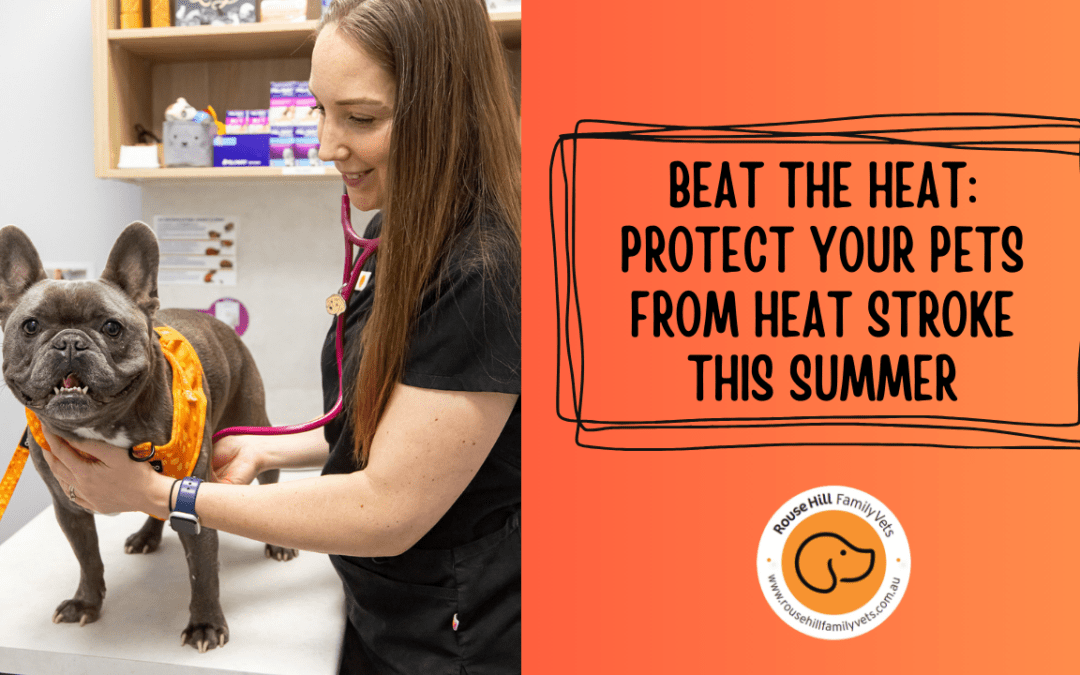As temperatures rise, so do the risks for our beloved pets. Did you know that every summer, many pets are rushed to the vet due to heat stroke? Tragically, some don’t make it. At Rouse Hill Family Vets, we want to ensure your furry friends stay safe during the scorching summer months.
The Dangers of Heat Stroke in Pets
Heat stroke is a serious and life-threatening condition that occurs when your pet’s body temperature rises to dangerous levels, and they can no longer cool themselves down. Unfortunately, here in Rouse Hill, we typically see at least one pet each summer lose their life to this preventable condition. This is particularly concerning for brachycephalic breeds (like Bulldogs, Pugs, and Frenchies) who have shorter airways and face increased risks in hot weather.
Why Heat Stroke is So Dangerous
When pets overheat, their organs can shut down rapidly, causing irreversible damage. Common signs of heat stroke include excessive panting, drooling, vomiting, diarrhea, lethargy, and even collapse. Without prompt intervention, heat stroke can lead to organ failure and death.
Exercising your dog in the middle of the day or leaving them in a hot car – even for a few minutes – can be a fatal mistake. It’s not just the obvious risks like direct sunlight; even walking your dog on hot pavement can cause heat-related stress.
And it’s not just the temperature you need to worry about—humidity can significantly increase your pet’s risk. When humidity levels are between 35-80%, your dog’s ability to cool down through panting is compromised, even if the ambient temperature seems bearable. This makes it much easier for them to overheat, so be extra cautious on humid days.

The Benefits of Prevention
The good news? Heat stroke is entirely preventable with a few simple changes in your pet’s routine. For instance, walking your dog early in the morning or late in the evening, when the weather is cooler, can drastically reduce their risk. For brachycephalic breeds, a thorough airway assessment at Rouse Hill Family Vets can help identify any breathing issues that may increase their vulnerability to heat.
Maintaining your pet’s weight is another important step. Overweight pets are more prone to heat stroke because excess fat acts as insulation, trapping heat in their bodies. At Rouse Hill Family Vets, we offer weight checks with our nurses and personalized diet plans to help your pet shed those extra kilos. A healthy weight not only reduces the risk of heat stroke but also improves your pet’s overall well-being.

What to Do if Your Pet is Suffering from Heat Stroke
If you suspect your pet is suffering from heat stroke, the most important thing you can do is bring them to a vet urgently. Time is critical in these situations. Studies have shown that the survival rate is significantly higher when pets are brought to the hospital within 90 minutes of showing clinical signs. Pets presented within 90 minutes had a survival rate of 62%, while those presented after 90 minutes had a much lower survival rate of 27%.
Cooling your pet before bringing them to the hospital may help, but it is not the most important factor for survival. The sooner your pet is seen by a vet, the better their chances. Cooling at home should be done with cool (not ice-cold) water, and you should prioritize getting them to the clinic as fast as possible.
Busting Common Myths
One common misconception is that simply cooling your pet down with an ice bath or a cold hose is enough to combat heat stroke. While cooling them down is important, sudden temperature changes can actually cause shock. The best approach is to cool them gradually by applying cool (not ice-cold) water to their body and bringing them into a shaded or air-conditioned area. If you suspect heat stroke, seek veterinary attention immediately.
Another myth is that it’s not “that hot” for your dog. Even on days when temperatures seem moderate, pets can easily overheat if they’re active, especially when humidity is high. It’s always better to err on the side of caution.

How Rouse Hill Family Vets Can Help
At Rouse Hill Family Vets, we offer a variety of services to help protect your pets from heat-related dangers:
- BOAS Assessments: Brachycephalic Obstructive Airway Syndrome (BOAS) is a condition common in flat-faced breeds. We provide thorough assessments to identify any airway issues that could put your pet at greater risk during the hot summer months.
- Weight Management Services: Our nurses offer regular weight checks and diet plans to help your pet maintain a healthy weight, reducing their risk of heat stroke and improving overall health.
- Emergency Care: In the unfortunate event of heat stroke, we’re ready to provide emergency care and, if needed, can refer you to specialized emergency services.
- Pawsome Pupsicle Recipes: Download our Pawsome Pupsicle Recipe Book and treat your dog to some cool, refreshing snacks this summer.
Protect Your Pet Today
Don’t wait until it’s too late! Book a BOAS assessment or a weight check to ensure your pet is prepared for the summer heat. You can easily schedule an appointment online through our website or by giving us a call at 02 9086 9130.
For more tips and to stay updated with our latest offers, follow us on social media @rousehillfamilyvets. Remember, prevention is always better than cure – let’s work together to keep your furry friends safe and cool all summer long.
At Rouse Hill Family Vets, we are all Fear Free certified and offer personalized care to every patient. Our Gold Standard Cat-Friendly Certified clinic ensures your pets are treated with the utmost compassion and expertise. Stay cool, stay safe, and don’t hesitate to reach out if you need us!


